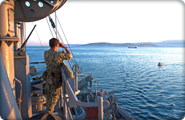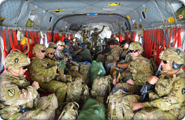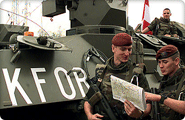 Menu
Menu

PICK A TOPIC & DISCOVER NATO


The most important players in the North Atlantic Treaty Organization are the member countries themselves.
THERE ARE CURRENTLY31MEMBERS
Sort alphabetically or Sort by date
NATO membership is open to “any other European state in a position to further the principles of this Treaty and to contribute to the security of the North Atlantic area.”
&nsbp;
&nsbp;

![]()
Security in our daily lives is key to our well-being. NATO’s purpose is to guarantee the freedom and security of its members through political and military means.
POLITICAL - NATO promotes democratic values and enables members to consult and cooperate on defence and security-related issues to solve problems, build trust and, in the long run, prevent conflict.
MILITARY - NATO is committed to the peaceful resolution of disputes. If diplomatic efforts fail, it has the military power to undertake crisis-management operations. These are carried out under the collective defence clause of NATO's founding treaty - Article 5 of the Washington Treaty or under a United Nations mandate, alone or in cooperation with other countries and international organisations.
NATO is committed to the principle that an attack against one or several of its members is considered as an attack against all. This is the principle of collective defence, which is enshrined in Article 5 of the Washington Treaty.
So far, Article 5 has been invoked once - in response to the 9/11 terrorist attacks in the United States in 2001.
NATO is an alliance of countries from Europe and North America. It provides a unique link between these two continents, enabling them to consult and cooperate in the field of defence and security, and conduct multinational crisis-management operations together.
Strategic Concepts lay down the Alliance’s core tasks and principles, its values, the evolving security environment and the Alliance’s strategic objectives for the next decade. The 2022 Strategic Concept reaffirms that NATO's key purpose is to ensure the collective defence of its members, based on a 360-degree approach, and outlines three core tasks – deterrence and defence, crisis prevention and management, and cooperative security.
![]()
Every day, member countries consult and take decisions on security issues at all levels and in a variety of fields.
A “NATO decision” is the expression of the collective will of all 31 member countries since all decisions are taken by consensus.
Hundreds of officials, as well as civilian and military experts, come to NATO Headquarters each day to exchange information, share ideas and help prepare decisions when needed, in cooperation with national delegations and the staff at NATO Headquarters.
![]()
NATO takes an active role in a broad range of crisis-management operations and missions, including civil emergency operations.
NATO’s crisis-management operations are carried out under Article 5 of the Washington Treaty or under a United Nations mandate.



NATO works with many non-member countries on a wide range of political and security-related issues. These countries pursue dialogue and practical cooperation with the Alliance and many contribute to NATO-led operations and missions. NATO is also cooperating with a wide network of international organisations.
Partner countries do not have the same decision-making authority as member countries.
LEARN MORE
ABOUT NATO'S PARTNERSHIPS
![]()
NATO has always innovated and adapted itself to ensure its policies, capabilities and structures meet current and future threats, including the collective defence of its members.

Signing of the Washington Treaty, 4 April

International Staff
International Military Staff
Integrated Military Command Structure